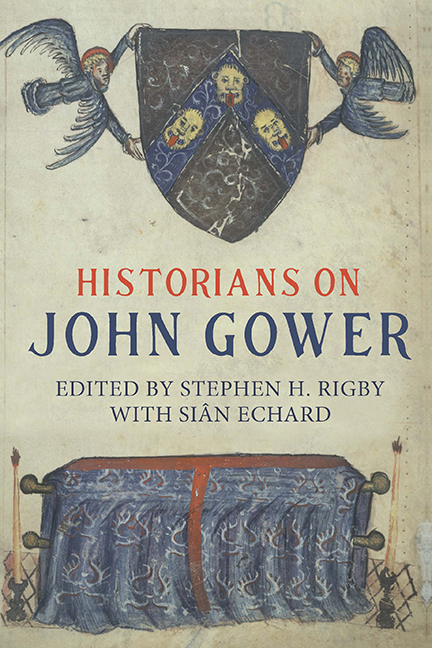Book contents
- Frontmatter
- Dedication
- Contents
- List of Illustrations
- Notes on Editors and Contributors
- Acknowledgements
- List of Abbreviations
- A Note on the References
- Preface: Gower in Context
- PART I Gower’s Life and Works
- PART II GOWER AND LAY SOCIETY
- PART III GOWER AND THE CHURCH
- PART IV GOWER AND GENDER
- PART V GOWER AND POLITICS
- PART VI GOWER AND COSMOGRAPHY
- Select Bibliography
- Index
- VOLUMES ALREADY PUBLISHED
Preface: Gower in Context
Published online by Cambridge University Press: 26 May 2022
- Frontmatter
- Dedication
- Contents
- List of Illustrations
- Notes on Editors and Contributors
- Acknowledgements
- List of Abbreviations
- A Note on the References
- Preface: Gower in Context
- PART I Gower’s Life and Works
- PART II GOWER AND LAY SOCIETY
- PART III GOWER AND THE CHURCH
- PART IV GOWER AND GENDER
- PART V GOWER AND POLITICS
- PART VI GOWER AND COSMOGRAPHY
- Select Bibliography
- Index
- VOLUMES ALREADY PUBLISHED
Summary
It is a commonplace of modern criticism that a fruitful way of understanding medieval literary texts is to consider the ways in which they engage with the social hierarchies, institutions, conventions, behaviours and ideologies of their day. As Janet Coleman put it, relatively few works of fourteenth-century literature ‘were meant merely to entertain but were intended to instruct, exhort and, ultimately, to inspire readers to criticize and eventually to reform social practice, by which was meant the behaviour of church officials and the politically and economically powerful’. As Helen Barr argues, literary language is neither independent of reality nor a passive reflection of it, but is itself a form of social practice or behaviour. Both old and new historicist approaches have been extremely influential amongst scholars of medieval literature, particularly those working on Geoffrey Chaucer. Yet, in many ways, the works of John Gower are even more readily open to historicist readings than are those of Chaucer, against which Gower's verse is so often compared or judged. After all, whilst Chaucer tended to engage with the social, political and religious controversies of the day obliquely or in an allegorical form, Gower explicitly addressed the conflicts which divided his contemporaries. If Chaucer's ‘Knight's Tale’ provides us with a mirror for princes in the guise of a roman antique about Duke Theseus of Athens, then Book VII of Gower's Confessio Amantis directly sets out the virtues needed in a king. Whilst Chaucer's ‘Miller's Tale’ is often read as a peasants’ revolt in literary form, with the Miller's bawdy fabliau being pitted against the hierarchical world-view of the ‘Knight's Tale’ which precedes it, Book I of Gower's Vox Clamantis offers us a detailed response to the events of the actual Peasants’ Revolt of 1381. Thus, although it would be a mistake to take Gower's works as merely straightforward reportage, it remains crucial to acknowledge how Gower addressed the issues of his day. Because Gower's work includes such overt political and social commentary, an understanding of the period in which his work was rooted is particularly important. The aim of this volume is to enable a group of historians to bring their specialist expertise to bear on Gower's poetry and to show what a detailed knowledge of England in the late fourteenth and early fifteenth centuries can add to our understanding of his work.
- Type
- Chapter
- Information
- Historians on John Gower , pp. xx - xxivPublisher: Boydell & BrewerPrint publication year: 2019



